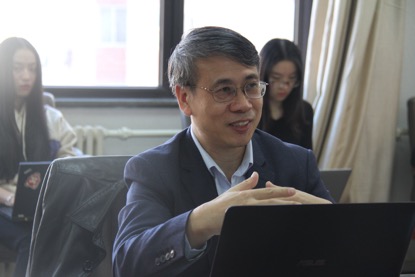Macro-Finance Salon (No. 83) Series of the 19th CPC National Congress (No. 7): Chinese Enterprises Ride with the Bond Market in Going Global
2017-12-17 IMI Wang Wei started from the corporate finance and bond market development advocated by President Xi Jinping at the 19th CPC National Congress. He then analyzed the development of China’s market-based bond market in recent years. By analyzing the financing advantages of direct financing and bond market against the stock market, he sorted out the advantages of enterprises in financing through the bond market and expounded the mutually reinforcing relationship between the external financing and the open-up of bond market. Wang Wei first analyzed the current state of China’s direct financing and emphasized the importance of direct financing. Then he pointed out the advantages of bond financing over equity financing. He noted that “debt financing is not so picky. All companies are treated equally. It is very flexible in terms of any currency, market, or time. The cycle is short, fast, reproducible, and diverse. Globally, its trading volume and stock volume are both bigger than the stock market.” As an example, Wang Wei also illustrates bond market financing practices by analyzing the financing history of Huawei and Evergrande in the bond market.
Next, Wang explained the financing advantages of “debt” and “equity” in depth. He vividly claimed that they are “the two legs that help enterprise develop”. Wang pointed out that by comparatively analyzing the bond market and stock market enterprises can carry out more forms of financing more flexibly. He analyzed the specific examples in the bond market and stock market in 2008 and 2009. Wang mentioned that this flexibility exists in the process of financing internationalization. Wang also made an analysis of the current situation of Chinese enterprises issuing bonds in the rest of the world in recent years. Since around 2012, Chinese enterprises started to issue a large amount of foreign debts on the basis of US dollar bonds. In 2017, the total amount of corporate issuance in China reached 1.2 trillion yuan, accounting for 70% of the market value in Asia and 30% to 40% of the total domestic and overseas financing. This not only broadened the financing channels, but also triggered brand effects to some extent. The volume on the bond market illustrates its unique advantage of international financing in the bond market. As for the development of enterprises in international business, debt financing is a very important part of financing diversification. Especially for private enterprises, foreign financing plays a key role in the internationalization of enterprises.
Then, Wang looked into the prospect of China’s foreign bond market from the perspective of the Belt and Road Initiative. He said that the huge capital demand triggered by the construction of the Belt and Road will fuel the bond market and this will be a very favorable opportunity for the internationalization of the Renminbi.
Wang Wei started from the corporate finance and bond market development advocated by President Xi Jinping at the 19th CPC National Congress. He then analyzed the development of China’s market-based bond market in recent years. By analyzing the financing advantages of direct financing and bond market against the stock market, he sorted out the advantages of enterprises in financing through the bond market and expounded the mutually reinforcing relationship between the external financing and the open-up of bond market. Wang Wei first analyzed the current state of China’s direct financing and emphasized the importance of direct financing. Then he pointed out the advantages of bond financing over equity financing. He noted that “debt financing is not so picky. All companies are treated equally. It is very flexible in terms of any currency, market, or time. The cycle is short, fast, reproducible, and diverse. Globally, its trading volume and stock volume are both bigger than the stock market.” As an example, Wang Wei also illustrates bond market financing practices by analyzing the financing history of Huawei and Evergrande in the bond market.
Next, Wang explained the financing advantages of “debt” and “equity” in depth. He vividly claimed that they are “the two legs that help enterprise develop”. Wang pointed out that by comparatively analyzing the bond market and stock market enterprises can carry out more forms of financing more flexibly. He analyzed the specific examples in the bond market and stock market in 2008 and 2009. Wang mentioned that this flexibility exists in the process of financing internationalization. Wang also made an analysis of the current situation of Chinese enterprises issuing bonds in the rest of the world in recent years. Since around 2012, Chinese enterprises started to issue a large amount of foreign debts on the basis of US dollar bonds. In 2017, the total amount of corporate issuance in China reached 1.2 trillion yuan, accounting for 70% of the market value in Asia and 30% to 40% of the total domestic and overseas financing. This not only broadened the financing channels, but also triggered brand effects to some extent. The volume on the bond market illustrates its unique advantage of international financing in the bond market. As for the development of enterprises in international business, debt financing is a very important part of financing diversification. Especially for private enterprises, foreign financing plays a key role in the internationalization of enterprises.
Then, Wang looked into the prospect of China’s foreign bond market from the perspective of the Belt and Road Initiative. He said that the huge capital demand triggered by the construction of the Belt and Road will fuel the bond market and this will be a very favorable opportunity for the internationalization of the Renminbi.
